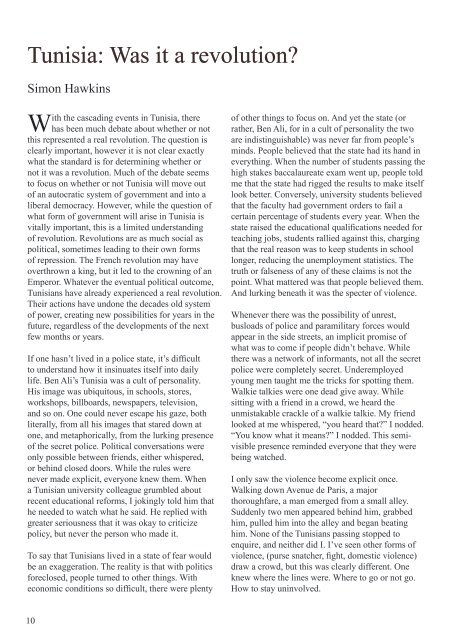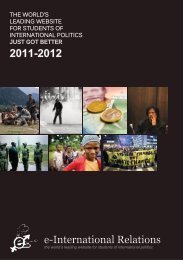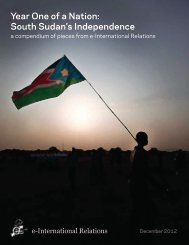The Arab Spring of Discontent - e-International Relations
The Arab Spring of Discontent - e-International Relations
The Arab Spring of Discontent - e-International Relations
Create successful ePaper yourself
Turn your PDF publications into a flip-book with our unique Google optimized e-Paper software.
Tunisia: Was it a revolution?<br />
Simon Hawkins<br />
With the cascading events in Tunisia, there<br />
has been much debate about whether or not<br />
this represented a real revolution. <strong>The</strong> question is<br />
clearly important, however it is not clear exactly<br />
what the standard is for determining whether or<br />
not it was a revolution. Much <strong>of</strong> the debate seems<br />
to focus on whether or not Tunisia will move out<br />
<strong>of</strong> an autocratic system <strong>of</strong> government and into a<br />
liberal democracy. However, while the question <strong>of</strong><br />
what form <strong>of</strong> government will arise in Tunisia is<br />
vitally important, this is a limited understanding<br />
<strong>of</strong> revolution. Revolutions are as much social as<br />
political, sometimes leading to their own forms<br />
<strong>of</strong> repression. <strong>The</strong> French revolution may have<br />
overthrown a king, but it led to the crowning <strong>of</strong> an<br />
Emperor. Whatever the eventual political outcome,<br />
Tunisians have already experienced a real revolution.<br />
<strong>The</strong>ir actions have undone the decades old system<br />
<strong>of</strong> power, creating new possibilities for years in the<br />
future, regardless <strong>of</strong> the developments <strong>of</strong> the next<br />
few months or years.<br />
If one hasn’t lived in a police state, it’s difficult<br />
to understand how it insinuates itself into daily<br />
life. Ben Ali’s Tunisia was a cult <strong>of</strong> personality.<br />
His image was ubiquitous, in schools, stores,<br />
workshops, billboards, newspapers, television,<br />
and so on. One could never escape his gaze, both<br />
literally, from all his images that stared down at<br />
one, and metaphorically, from the lurking presence<br />
<strong>of</strong> the secret police. Political conversations were<br />
only possible between friends, either whispered,<br />
or behind closed doors. While the rules were<br />
never made explicit, everyone knew them. When<br />
a Tunisian university colleague grumbled about<br />
recent educational reforms, I jokingly told him that<br />
he needed to watch what he said. He replied with<br />
greater seriousness that it was okay to criticize<br />
policy, but never the person who made it.<br />
To say that Tunisians lived in a state <strong>of</strong> fear would<br />
be an exaggeration. <strong>The</strong> reality is that with politics<br />
foreclosed, people turned to other things. With<br />
economic conditions so difficult, there were plenty<br />
<strong>of</strong> other things to focus on. And yet the state (or<br />
rather, Ben Ali, for in a cult <strong>of</strong> personality the two<br />
are indistinguishable) was never far from people’s<br />
minds. People believed that the state had its hand in<br />
everything. When the number <strong>of</strong> students passing the<br />
high stakes baccalaureate exam went up, people told<br />
me that the state had rigged the results to make itself<br />
look better. Conversely, university students believed<br />
that the faculty had government orders to fail a<br />
certain percentage <strong>of</strong> students every year. When the<br />
state raised the educational qualifications needed for<br />
teaching jobs, students rallied against this, charging<br />
that the real reason was to keep students in school<br />
longer, reducing the unemployment statistics. <strong>The</strong><br />
truth or falseness <strong>of</strong> any <strong>of</strong> these claims is not the<br />
point. What mattered was that people believed them.<br />
And lurking beneath it was the specter <strong>of</strong> violence.<br />
Whenever there was the possibility <strong>of</strong> unrest,<br />
busloads <strong>of</strong> police and paramilitary forces would<br />
appear in the side streets, an implicit promise <strong>of</strong><br />
what was to come if people didn’t behave. While<br />
there was a network <strong>of</strong> informants, not all the secret<br />
police were completely secret. Underemployed<br />
young men taught me the tricks for spotting them.<br />
Walkie talkies were one dead give away. While<br />
sitting with a friend in a crowd, we heard the<br />
unmistakable crackle <strong>of</strong> a walkie talkie. My friend<br />
looked at me whispered, “you heard that?” I nodded.<br />
“You know what it means?” I nodded. This semivisible<br />
presence reminded everyone that they were<br />
being watched.<br />
I only saw the violence become explicit once.<br />
Walking down Avenue de Paris, a major<br />
thoroughfare, a man emerged from a small alley.<br />
Suddenly two men appeared behind him, grabbed<br />
him, pulled him into the alley and began beating<br />
him. None <strong>of</strong> the Tunisians passing stopped to<br />
enquire, and neither did I. I’ve seen other forms <strong>of</strong><br />
violence, (purse snatcher, fight, domestic violence)<br />
draw a crowd, but this was clearly different. One<br />
knew where the lines were. Where to go or not go.<br />
How to stay uninvolved.<br />
Lurking over all <strong>of</strong> this was the hulk <strong>of</strong> the Ministry<br />
<strong>of</strong> the Interior building on Habib Bourguiba Avenue.<br />
As befits its occupants, it’s an ugly gray building<br />
with dramatic iron bars across the windows.<br />
Although torture and abuse took place in a variety<br />
<strong>of</strong> locations in Tunisia, this was the center <strong>of</strong> it all.<br />
No regular person could get too close to it. <strong>The</strong><br />
sidewalk in front was closed to pedestrians and it<br />
was forbidden to even point a camera at it. It was the<br />
embodiment <strong>of</strong> the state’s repression, and it was the<br />
focus <strong>of</strong> the massive protests on the final days <strong>of</strong> Ben<br />
Ali’s rule. <strong>The</strong>re were other places they could have<br />
assembled. Constitutionally, the seat <strong>of</strong> power should<br />
have been found in the Place du Gouvernment in<br />
the Kasbah, but it did not have the same power in<br />
people’s lives. One isn’t forced to cross the street to<br />
avoid those buildings and tourists are encouraged to<br />
take photographs.<br />
To rally in front <strong>of</strong> the Interior Ministry was to<br />
reject Ben Ali’s entire power structure. If they could<br />
demonstrate that that building had no power over<br />
them, that they refused to be afraid <strong>of</strong> its alwayslurking<br />
threat to them, then the entire structure <strong>of</strong><br />
governmental domination was undone. Crossing<br />
the line irrevocably changed the nature <strong>of</strong> power in<br />
Tunisia. While the uprising had been growing for<br />
weeks and could, in theory, have gone on for much<br />
longer, once the demonstrators seized that space, the<br />
end, and a rapid one at that, was inevitable.<br />
<strong>The</strong> vast majority <strong>of</strong> experts had not predicted a<br />
revolution. Certainly the motivations were clear to<br />
all but the most casual observer, but such an event<br />
was unprecedented in the <strong>Arab</strong> world. <strong>The</strong> Tunisians<br />
themselves had great resentment toward the state<br />
and the president, but there was little hope that any<br />
change was possible. <strong>The</strong> events <strong>of</strong> December and<br />
January shattered that impression, changing the<br />
preconceptions <strong>of</strong> outsiders, but also <strong>of</strong> Tunisians<br />
themselves. Tunisians became unified and proud.<br />
<strong>The</strong>y realized the power they possess.<br />
What they do with that power is a separate question.<br />
Yes, the future is unclear. <strong>The</strong>re are no guarantees<br />
<strong>of</strong> liberal democracy. A different form <strong>of</strong> autocracy<br />
may well arise. <strong>The</strong> unity among the protestors has<br />
already eroded. Corruption can never be completely<br />
eradicated. <strong>The</strong> unrest will not aid the precarious<br />
economy. But the people have proved to others and<br />
themselves that they can unite to defy an oppressive<br />
government. If the future is unclear, what has<br />
changed is that the Tunisian people are now playing<br />
a role in forming it. Unlike Egypt, where the military<br />
pushed through a new constitution shortly after<br />
the Mubarak’s fall, in Tunisian debate about how<br />
to recreate the constitution galvanizes much <strong>of</strong> the<br />
population and the people refuse to be rushed into<br />
precipitous decisions. It is clear that the government<br />
cannot act without the support <strong>of</strong> the people. <strong>The</strong>ir<br />
example has changed the relations <strong>of</strong> citizens to<br />
governments across the region, creating a new sense<br />
<strong>of</strong> what is possible. Countless pundits and experts<br />
have been proved wrong in their predictions about<br />
the developing events in the Middle East and it<br />
would be foolish to claim knowledge <strong>of</strong> what will<br />
happen in the future, but one thing is quite clear;<br />
there has been a revolution.<br />
10 11







